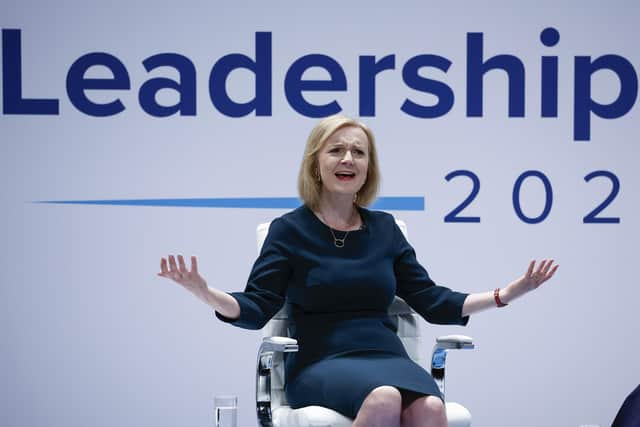Liz Truss resigns: Tories' post-Brexit psychodrama adds weight to cerebral case for Scottish independence – Joyce McMillan
During these last few months of Conservative meltdown at Westminster, the showbusiness analogies have come thick and fast from a transfixed media and public – clown show, circus, pantomime, tragedy, absolute farce; and the latest act is now playing out around Downing Street, as Liz Truss prepares to step out of the limelight, and to be replaced by a new Tory leader, elected within the next week.
The point about politics, though, is that no matter how often it is discussed in these terms – who’s on stage, who’s off, who’s a rising star, or a busted flush – it is always about much more than the detail of that Westminster soap opera. As millions in Britain have learned to their horrifying cost, in recent weeks, political game-playing can have shocking real-life consequences, in the shape of weakened currency, soaring interest rates, and threatened pensions; and when I contemplate that real political battlefield, this autumn, I cannot help feeling humiliated and grief-stricken, by the shameful shambles the politics of this country has become.
Advertisement
Hide AdAdvertisement
Hide AdThe current phase of deepening chaos is traced back by many to the EU referendum of 2016, that festival of lies and opportunism in which a painfully narrow Leave majority was obtained amid a torrent of illegal funding arrangements and “fake news” campaigning. The truth, though, is that the convenient lies began decades before that, with the growing acceptance of that neoliberal orthodoxy – attractive to the wealthy and powerful, but never founded on fact or history – which suggested that nations could be made wealthier by freeing the rich to get richer, while bearing down on those rights and publicly funded services that enable ordinary citizens and workers to share in the national wealth.
The current state of the UK – with millions now unable to afford the basics of food, energy and housing – is therefore an indictment not only of Brexit and its consequences, but of decades of failed economic policy, only partly mitigated by the Blair-Brown governments of 1997-2010; and as one who grew up in a post-war Britain proud of its commitment to the welfare state, and to secure full employment and a living wage for all its people, I feel – and have felt since the 1980s – a profound sense of shock and loss at the deliberate dismantling of that country by Tory ideologues who always despised the post-war settlement, and by their successors today.
It was my growing sense that that Britain was irretrievably lost, and that unionist politicians had no vision of how to restore it, that led me to vote ‘yes’ in the Scottish independence referendum of 2014, for the chance of a sustainable 21st-century social democracy; and the politics of the last eight years has only confirmed – more spectacularly than I could have imagined – my judgment about the worrying trajectory of British politics. We are where we are, though; and the age of disruption through which have lived since 2016, now deepened to crisis by the war in Ukraine, certainly makes it tempting to believe that all we need do, to set things right again in the UK, is to vote for a Labour government under ‘sensible’ Keir Starmer, who will sweep all these decades of Tory madness away, and start investing in ordinary British people again.
And yet it is difficult not to feel, given the extent of the recent chaos at Westminster, that there are now structural problems in the UK, and patterns of power and influence, which will not be healed by a simple change of government. In order to reach their present commanding position in the polls, Labour has had to swallow the big lie that is Brexit, wrap itself in Union flags, talk hostile nonsense about the SNP, and say very little about any constitutional change at all; and it is difficult to entertain high hopes of real change, under a party whose leader dare not even challenge the no-longer-fit-for-purpose first-past-the-post electoral system that gave Boris Johnson a huge 2019 majority on 43 per cent of the vote, that effectively contains no entrenched checks and balances on the power of a Prime Minister with a large parliamentary majority, and that finally gave us the government of infantile right-wing zealots that imploded yesterday, after inflicting such grievous damage on the people of the UK.
The choice between the Union and independence is often mischaracterised, by UK commentators, as one between “head and heart”, with the Union representing the rational choice, and independence a kind of emotional impulse involving blue face-painting and shouts of “freedom”. In truth, though, it seems to me that for many Scots of a certain age the decision is the exact opposite; that we would love to believe the more kindly and redistributive Britain of our youth can be restored, but increasingly sense that Scotland and England are on different political journeys which cannot easily be contained within the same state, and increasingly require the negotiation of a new relationship.


For that real political conversation to start, though, Scotland first has to nerve itself to assert its sovereignty, at least in principle, through a positive independence vote. Otherwise, we will remain a region of sovereign Westminster, fated to be dragged through a post-Brexit psychodrama that is increasingly not our own, although it features many familiar themes; and that now takes place outside the EU arena where Scotland voted to remain, and where we would have wished – not as a game, but for the future of all our people – to play our full part.
Comments
Want to join the conversation? Please or to comment on this article.
